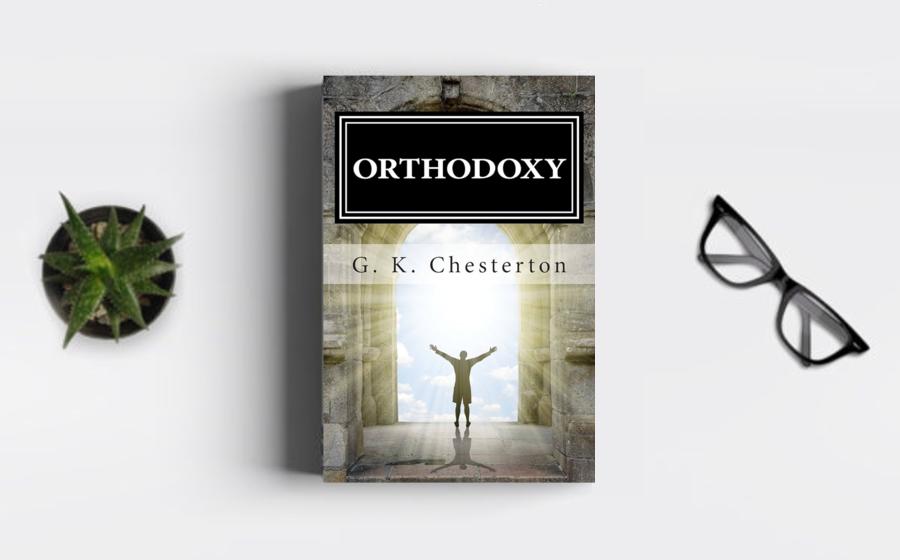G.K. Chesterton's "Orthodoxy" stands as a masterpiece
that weaves together wit, wisdom, and profound insights
into the nature of faith and imagination. Published in
1908, this seminal work explores Chesterton's journey
from skepticism to a vibrant and robust embrace of
Christian orthodoxy. In this review, we will delve into
why "Orthodoxy" is celebrated as one of the most
inspirational books of all time, examining Chesterton's
unique blend of intellectual rigor, imaginative genius,
and unwavering commitment to the eternal truths that
define the Christian faith.
At its
core, "Orthodoxy" is a journey, Chesterton's journey from
the dark alleys of skepticism to the radiant vistas of
faith. The narrative unfolds as a spirited defense of
Christian orthodoxy, with Chesterton wielding his pen as
both a philosopher and a poet. The intellectual rigor
applied to the examination of his own doubts and the
foundations of belief makes "Orthodoxy" a captivating
exploration for readers who, like Chesterton, seek to
reconcile reason with faith.
Chesterton's ability
to articulate complex theological concepts with clarity
and charm is a testament to his intellectual prowess.
Through witty and insightful prose, he takes readers on
a pilgrimage of the mind, challenging prevailing
ideologies and dismantling the barriers that often
hinder sincere engagement with matters of faith.
"Orthodoxy" emerges not as a dry theological treatise
but as a vibrant and living testament to the vitality of
Christian thought.
Central to Chesterton's thesis in
"Orthodoxy" is the symbiotic relationship between faith
and imagination. He argues that imagination, far from
being the enemy of reason, serves as its necessary and
enriching companion. Chesterton's exploration of the
fantastical and the miraculous becomes a celebration of
the creative force inherent in the Christian narrative.
In embracing Christian orthodoxy, he contends, one is
not forsaking reason but engaging in a profoundly
imaginative endeavor that encompasses the totality of
human experience.
Chesterton's defense of the
imaginative richness of Christian dogma resonates with
readers seeking a faith that transcends mere
intellectual assent. Through his vivid and imaginative
prose, he invites individuals to enter into a realm
where the miraculous and the ordinary coexist,
challenging them to perceive the world through the lens
of wonder. "Orthodoxy" becomes a call to reclaim the
sense of awe and marvel that often eludes modern minds,
presenting Christianity not as a set of dry doctrines
but as a grand and captivating narrative that captures
the heart and mind.
One cannot engage with
Chesterton's work without encountering his signature
wit. In "Orthodoxy," Chesterton employs humor not merely
as a literary device but as a potent apologetic tool.
His wit serves as a joyful proclamation of the Christian
faith, disarming skepticism and inviting readers to
reconsider their preconceived notions about religion.
Chesterton's humorous approach to apologetics
fosters an atmosphere of warmth and accessibility.
Rather than adopting a confrontational stance, he gently
leads readers through the labyrinth of doubt, using wit
as a lantern to illuminate the path to faith. In doing
so, "Orthodoxy" becomes an engaging and enjoyable
journey, where the serious business of theology is
accompanied by the laughter that arises from a
recognition of the paradoxes and mysteries inherent in
the Christian worldview.
"Orthodoxy" celebrates the romance of reality,
asserting that the Christian faith does not divorce
itself from the tangible and the ordinary but infuses
these aspects of life with profound significance.
Chesterton contends that Christianity, with its
doctrines of creation and incarnation, transforms the
mundane into the miraculous.
Through his poetic
prose, Chesterton beckons readers to view the world with
fresh eyes, to perceive the ordinary as extraordinary.
The commonplace becomes a canvas on which the divine
paints its masterpieces, and the beauty of existence is
unveiled in all its richness. "Orthodoxy" becomes a
manifesto for those seeking a faith that not only
acknowledges the sacred in the everyday but revels in
it, elevating the mundane to the status of the
miraculous.
Central to Chesterton's defense of
Christian orthodoxy in "Orthodoxy" is an embrace of
mystery. He contends that Christianity, far from seeking
to eliminate paradoxes, thrives on them. Chesterton's
exploration of the paradoxes embedded in Christian
dogma, such as the Incarnation and the Trinity, becomes
a celebration of the mysterious and the awe-inspiring.
By embracing mystery, Chesterton argues, one does
not surrender reason but acknowledges its limitations in
grasping the infinite. The Christian faith, with its
paradoxes, invites believers into a realm where
intellectual humility and awe converge. "Orthodoxy"
becomes a guide for those who yearn for a faith that
does not shy away from the enigmatic but revels in it,
recognizing that the mysteries of the Christian
narrative are not impediments to belief but gateways to
a deeper and more profound understanding of the divine.
"Orthodoxy" extends beyond the realm of
personal belief to offer a social critique, particularly
aimed at the materialism and skepticism of Chesterton's
time. In a society increasingly enamored with the
material and dismissive of the spiritual, Chesterton's
defense of orthodoxy serves as a counter-cultural
manifesto.
His insights into the dangers of a
materialistic worldview and the impoverished nature of
purely secular philosophies resonate with contemporary
readers navigating similar challenges. "Orthodoxy"
becomes a prophetic voice, challenging the prevailing
currents of thought and urging individuals to reconsider
the spiritual dimensions of existence in the face of a
materialistic culture.
"Orthodoxy" stands as one of the most inspirational books of all time due to G.K. Chesterton's unique blend of intellectual rigor, imaginative genius, and unyielding commitment to Christian orthodoxy. The narrative unfolds as a journey of intellectual discovery, a celebration of the imaginative richness of faith, a humorous apologetic that disarms skepticism, an unveiling of the romance inherent in reality, a defense of mystery, and a social critique against materialism.






